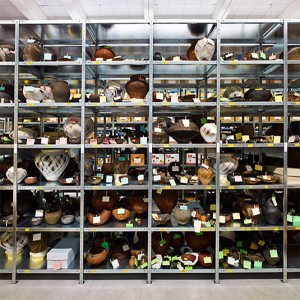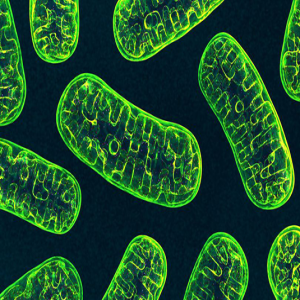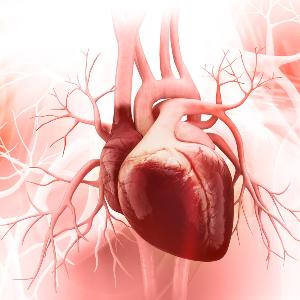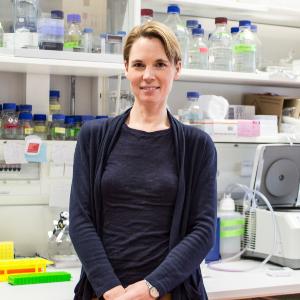-
Revelatory relationship
A new study of the ecology of an enigmatic group of novel unicellular organisms by LMU scientists supports the idea hydrogen played an important role in the evolution of Eukaryota, the first nucleated cells.
-
“We’ll be in later”
Students attending a high school in Germany can decide whether to begin the schoolday at the normal early time or an hour later. According to LMU chronobiologists, the measure has had a positive effect on both their sleep and learning experience.
-
Genes as early warning systems
Estimates based on genomic data predict stroke risk with an accuracy similar to, or greater than those based on clinical risk factors. This result implies that persons at high risk might benefit from more rigorous preventive measures.
-
Hitting HIT
Heparin is widely used as an anticoagulant, but evokes in some patients a potentially life-threatening condition called HIT. Clinical scientists at LMU have now shown that inhibition of a single enzyme may markedly reduce this risk.
-
Is the marshmallow test still valid?
LMU economist Fabian Kosse has re-assessed the results of a replication study which questioned the interpretation of a classical experiment in developmental psychology. The new analysis reaffirms the conclusions of the original study.
-
How cells muster and march out
Many of the cell types in our bodies are constantly on the move. LMU physicists have developed a mathematical model that describes, for the first time, how single-cell migration can coalesce into coordinated movements of cohorts of cells.
-
Four new ERC-funded projects
The European Research Council has awarded four of its prestigious highly endowed Consolidator Grants to researchers at LMU.
-
Methylation and mopping up
LMU researchers have discovered a novel type of chemical modification in bacterial RNAs. The modification is apparently attached to molecules only when cells are under stress, and is rapidly removed during recovery.
-
Galactic Heavyweight-Champion
Black hole with 40 billion solar masses found: In the center of the galaxy cluster "Abell 85" is the largest black hole in the nearby universe – it is probably the result of multiple mergers of smaller black holes.
-
Living laboratories
LMU biologists Marcel Dann and Dario Leister have demonstrated for the first time that cyanobacteria and plants employ similar mechanisms and key proteins to regulate cyclic electron flow during photosynthesis.
-
The relation between speech and action
In a BMBF-funded project, LMU linguist Julia Büttner-Kunert plans to assess the quality of interpersonal communication in individuals with dementia and people traumatic brain injuries, with the aim to develop new approaches to therapy.
-
Economizing on iridium
Iridium is an ideal catalyst for the electrolytic production of hydrogen from water – but it is extremely expensive. But now a new kind of electrode made of highly porous material does an excellent job with just a hint of iridium.
-
ERC Synergy Grants for LMU
Researchers in the Faculties of Biology and Physics at LMU have received highly sought-after grants from the European Research Council (ERC) for two interdisciplinary research projects.
-
Social inequality in Bronze Age households
Archaeogenetic analyses provide new insights into social inequality 4000 years ago: nuclear families lived together with foreign women and individuals from lower social classes in the same household.
-
One-Pot Wonder
Before life, there was RNA: Scientists at LMU show how the four different letters of this genetic alphabet could be created from simple precursor molecules on early Earth - under the same environmental conditions.
-
Rotation on an eight-shaped path
Chemical engineers at Ludwig-Maximilians-Universität (LMU) in Munich, Germany, have developed the first molecular motor that enables an eight-shaped movement.
-
Earthquake motions triggered surprise tsunami
Combining earthquake and tsunami computer models of the 2018 tsunami in Palu, researchers identified underlying causes of the deadly tsunami and uncover critical role of direct earthquake motions.
-
The art of worming through tight spaces
How active matter, such as assemblages of bacterial or epithelial cells, manages to expand into narrow spaces largely depends on their growth dynamics, as LMU physicists demonstrate in a newly published study.
-
Potential drop signals imminent danger
Misfolded proteins must be promptly eliminated as they can form toxic aggregates in cells. LMU biologists have studied how this process is triggered in mitochondria and identified a general alarm signal that activates it.
-
The importance of interfaces
Tiny gas-filled bubbles in the porous rock found around hot springs are thought to have played an important role in the origin of life. Temperature differences at the interface between liquid phases could therefore have initiated prebiotic chemical ev...
-
Motor proteins and membrane dynamics
Motility is an essential property of many cell types, and is driven by molecular motors. An LMU team has now discovered that the motor protein myosin VI contributes directly to the deformation of the cell membrane, as required for locomotion or endocy...
-
Sushi for synapses
Synapses between nerve cells in the brain undergo constant remodeling, which is the basis of learning. An LMU team has now traced the molecules that direct remodeling and shown that they circulate in the living cell like running sushi.
-
The ABC of ribosome recycling
Ribosomes, the essential machinery used for protein synthesis is recycled after each one round of translation. An enzyme called ABCE1 is responsible for this process and turns out to be remarkably plastic as LMU biophysicists report.
-
New light on cichlid evolution in Africa
A collaborative research project carried out under the auspices of the GeoBio-Center at LMU has developed an integrative approach to the classification of fossil cichlids, and identified the oldest known member of the Tribe Oreochromini.
-
Impending threats to biodiversity
A new study compares the effects of expansion vs. intensification of cropland use on global agricultural markets and biodiversity, and finds that the expansion strategy poses a particularly serious threat to biodiversity in the tropics.
-
Not just supporting actors
Non-classical monocytes were long thought to play a purely surveillance role in the immune system. With the aid of a novel marker (PD-L1), LMU researchers have now shown that they are directly involved in the regulation of immune response.
-
 What the Celts drank
What the Celts drankA new study sheds light on the beverages favored by the Celts in Iron Age Central Europe, and reveals what else was on their menu some 2500 years ago.
-
 Protein quality control and mitochondria
Protein quality control and mitochondriaProtein aggregates are toxic for mitochondrial function, and thus disrupt the supply of chemical energy to their host cells. An LMU team has characterized a protein complex that prevents the build-up of such deposits in the organelles.
-
A prebiotic route to DNA
DNA, the hereditary material, may have appeared on Earth earlier than has been assumed hitherto. LMU chemists led by Oliver Trapp show that a simple reaction pathway could have given rise to DNA subunits on the early Earth.
-
Check the traffic lights!
How can current levels of soft-drink consumption be effectively reduced? A team of researchers in Munich has identified a set of measures that have been shown to work.
-
Promoting self-healing after heart attack
LMU researchers led by Oliver Söhnlein have shown that a protein which stimulates the resolution of inflammatory reactions enhances cardiac repair following heart attack in both mice and pigs.
-
What organizes the genome in the nucleus?
Spatial separation of active from inactive fractions of the genome in the cell nucleus is crucial for gene expression control. A new study uncovers leading mechanisms of such separation and turns our picture of the nucleus upside down.
-
What makes pathogens successful?
A new EU-funded Innovative Training Network in the field of infection biology and chromatin biology will begin at LMU in November. The interdisciplinary ITN will explore the interactions between unicellular pathogens and their hosts at the single-cell...
-
Signs of selection in the stomach
Helicobacter pylori, a globally distributed gastric bacterium, is genetically highly adaptable. Microbiologists at LMU have now characterized its population structure in individual patients, demonstrating an important role of antibiotics for its withi...
-
Measures for cleaner air
Worldwide, a broad range of measures have been introduced to reduce outdoor air pollution. A systematic review by LMU epidemiologists takes stock of the evidence, and recommends a greater focus on improved evaluation methods and study design.
-
Making the best of sparse information
New findings reported by LMU researchers challenge a generally accepted model of echolocation in bats. They demonstrate that bats require far less spatial information than previously thought to navigate effectively.
-
Induced cell death destabilizes plaques
Many chronic disorders arise from misdirected immune responses. A LMU team led by Oliver Söhnlein now shows that neutrophils exacerbate atherosclerosis by inducing smooth muscle-cell death and that a tailored peptide inhibits the process.
-
Gut microbe helps thwart Salmonella
LMU researchers have identified a bacterial species in the gut microbiome of the mouse which protects against infection by human-pathogenic Salmonella.
-
The complexity of division by two
LMU researchers have identified a novel protein that plays a crucial role in the formation of the mitotic spindle, which is essential for correct segregation of a full set of chromosomes to each daughter cell during cell division.
-
Personalities promote adaptability
Bold great tits lay their eggs earlier when under threat, the shy ones put it off. Such personality differences help maintain the biological variation essential for the survival of populations, as LMU biologists have now shown.
-
Stable majorities
How could prebiotic information-bearing DNA sequences survive in the face of competition from a vast excess of shorter molecules with random sequences? LMU scientists now show that a relatively simple mechanism could have done the trick.
-
Three LMU researchers among the winners
The European Research Council (ERC) has awarded Advanced Grants to three principal investigators at LMU.
-
Birds of a feather …
Carrion crows and hooded crows are almost indistinguishable genetically, and hybrid offspring are fertile. LMU biologists now show that the two forms have remained distinct largely owing to the dominant role of plumage color in mate choice.
-
Downsizing the particle accelerator
Munich physicists have succeeded in demonstrating plasma wakefield acceleration of subatomic particles in a miniaturized, laser-driven model. The new system provides a broader basis for the development of the next generation of particle accelerators.
-
Primed for memory formation
A new study carried out in a collaboration between researchers from LMU and UC San Diego suggests that new sensory experiences are encoded in pre-existing patterns of neuronal activity, which are recalled, modulated and enhanced following periods of b...
-
A surprising, cascading earthquake
The Kaikoura earthquake in New Zealand in 2016 caused widespread damage. LMU researchers have now dissected its mechanisms revealing surprising insights on earthquake physics with the aid of simulations carried out on the supercomputer SuperMUC.
-
One transistor for all purposes
In mobiles, fridges, planes – transistors are everywhere. But they often operate only within a restricted current range. LMU physicists have now developed an organic transistor that functions perfectly under both low and high currents.
-
Tiny “blinkers” reveal molecules inside cells
LMU physicists led by Ralf Jungmann introduce an entirely new approach to super-resolution microscopy: Tiny ‘blinkers’ enable simultaneous imaging of multiple biomolecules.
-
Opening the Black Box of Dendritic Computing
How do nerve cells compute? This fundamental question drives LMU neurobiologists led by Andreas Herz. They have now presented a novel method to disentangle complex neural processes in a much more powerful way than was previously possible.
-
On farmland, latecomers lose out
Wild bees in Europe are in trouble – more than 50% of local species are now classified as endangered. Recent findings by LMU researchers indicate that, in farming areas, species that emerge in late summer are most acutely threatened.
-
Signals on the scales
How are the images cast on the retina reassembled in the brain? Researchers in Munich and Tübingen find that processing of visual stimuli occurs at the earliest waystation on the way to the visual cortex – but not all are treated equally.
-
Fluctuations clear the way
LMU chemists have identified a mechanism that allows molecules to diffuse rapidly on the already crowded surface of a solid-state catalyst – an important capability, especially for efficient catalysis under industrial conditions.
-
Robot saved, people take the hit
To what extent are people prepared to show consideration for robots? A new study suggests that, under certain circumstances, some people are willing to endanger human lives – out of concern for robots.
-
Larger datasets unravel deep roots
Comparative genome content analyses provide insight into the early evolution of animals. A novel method that permits the use of larger datasets in such studies yields results that are consistent with classical views of animal phylogeny.
-
Identification of a central regulator
A new study by LMU researchers shows that the protein ApoE plays a key role in the pathogenesis of diseases associated with chronic inflammation, and identifies a new target for therapeutic strategies against atherosclerosis and Alzheimer’s disease.
-
 Overshooting the mark
Overshooting the markAn LMU team has shown that a protein called midkine, a member of the class of signaling molecules known as cytokines, is a key driver of inflammation in the heart muscle that can lead to heart failure in patients with myocarditis.
-
Perilous ruptures
The permanent neurological deficits of multiple sclerosis patients largely depend on the extent of degeneration of long nerve fibers. The latter is initiated by ruptures in the cell membrane and the resulting influx of calcium ions.
-
 New AI project gets underway
New AI project gets underwayIndustrial processes, mobility, health and biosciences are fields where machine learning can play a prominent role. The Federal Ministry of Education and Research will fund four new research centers in this area, one based at LMU and TUM.
-
 In quest of the common denominator
In quest of the common denominatorLMU biochemist Dorothee Dormann studies the pathogenesis of severe neurodegenerative diseases, and has now won the Paul Ehrlich and Ludwig Darmstaedter Prize for Young Researchers.
-
 Delayed adaptation favors coexistence
Delayed adaptation favors coexistenceSoil bacteria must be able to adapt to varying environmental conditions. – But a new study by LMU researchers indicates that rapid adaptation can be counterproductive, while delayed adjustment facilitates coexistence of different species.
-
 Restrictions rein in gun violence
Restrictions rein in gun violenceLegal restrictions on the possession of firearms reduce the incidence of murder and suicide in Western European countries, according to a new study done by political scientists at LMU.

